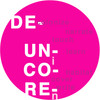of BUILDING RELATIONS and FINDING a VOICES
Scene: Open Air Museum of Decoloniality (former Alexanderplatz), Berlin.
Acting (non)persons: people, thoughts, things, trees (hiding the scene from the eyes of suspicious policemen), the sun, in whose sunset the threads of words are intertwined.
Language:???
- Contradictions of an Omnireducing Binarities
- Tools of Non-Binary Speech
- Demonopolize Languages
- Poetics of Relations
- of BUILDING RELATIONS and FINDING a VOICES
Contradictions of an Omnireducing Binarities
These were originally ruminations nearby non-binarity. To be more precise, there were irritations from the limitations of binary oppositions in several nodes-intersections of thinking, feeling, sharing with others. Why are good and evil opposed? Why are dark and light in conflict and clash? Why is the dead not the alive? Why is our thinking so rigid that it collapses regularly into discussions of opposing pairs and produces exclusionary judgments?
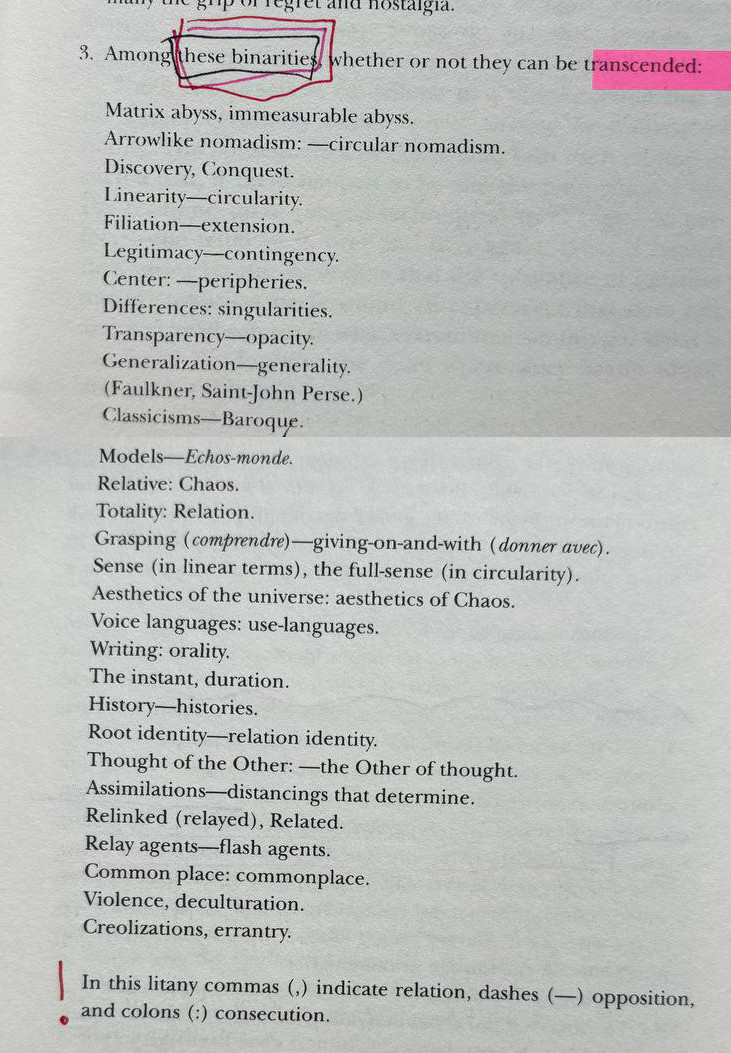
The irritation at our own thinking can be a useful nudge to come to a conversation on language. Language speaks by us, language speaks instead of us, language was before and will be after. This scope of ideas was voiced a hundred years ago by the philosopher Ludwig Wittgenstein and other linguistic researchers. Wittgenstein believed that if we could sort out words through experience, then objective reality would become the same one for everyone. He wanted to escape from multi-realities. From Pluriverse. As far as we know, he was disappointed in this positivist view of the world. But this insight — language limits human perception — stays with us and will continue to assist in exploring the possibilities of non-binary thinking.
J.R.R. Tolkien in The Lord of the Rings wanted to create language, he was only interested in that. Narration, characters, landscapes — it was all about developing a fictional non-existent language:
Nobody believes me when I say that my long book is an attempt to create a world in which a form of language agreeable to my personal aesthetic might seem real. But it is true. An enquirer (among many) asked what the L.R. was all about, and whether it was an 'allegory'. And I said it was an effort to create a situation in which a common greeting would be elen síla lúmenn' omentieimo, and that the phase long antedated the book. I never heard any more.
— J.R.R. Tolkien, from a letter to Christopher Tolkien 21 February 1958.
How did it turn out? A masculine story about brave white peasant guys saluting monarchical patriarchal structures with a "civilization mission" and fighting a cartoonish evil with a racist odor that doesn’t have a single hint of complexity. It’s a very binary situation. It seems Tolkien, in creating a new language, was unable to overcome the traps of the language spoken by him — binary oppositions, Eurocentrism, patriarchal dominance, monarchist nostalgia, enforced narrow civilizing mission, white privilege. Creating the myth in the twentieth century the writer could not overcome the framework of medieval European languages and epistemologies, skipping the entire first half of the twentieth century completely by.
Tools of Non-Binary Speech
Sexist language, racist language, theistic language — all are typical of the policing languages of mastery, and cannot, do not permit new knowledge or encourage the mutual exchange of ideas.
Language is a parasite
Language is a migrant
Language is a game.
Language should be tortured to tell the truth
If we are made through language and if we can narrate ourselves only through the language that made us
Speech is sharped Breath
Language is something that you can steal
Language is something that cannot be created
So we need tools. The first one is to keep an eye on the speech. To observe. Second, looking for cracks in the language. Third — a game with nearby rules and the impossibility of finishing it.
As cracks, we started by creating parasite words that collide binary oppositions with themselves. This is an easy game, such word-glitches could be continued endlessly. Just try! The main thing is to believe that what they mean really exists. Coldhot is a normal aggregate state of matter.
We die. That may be the meaning of life. But we do language. That may be the measure of our lives.
— Toni Morrison
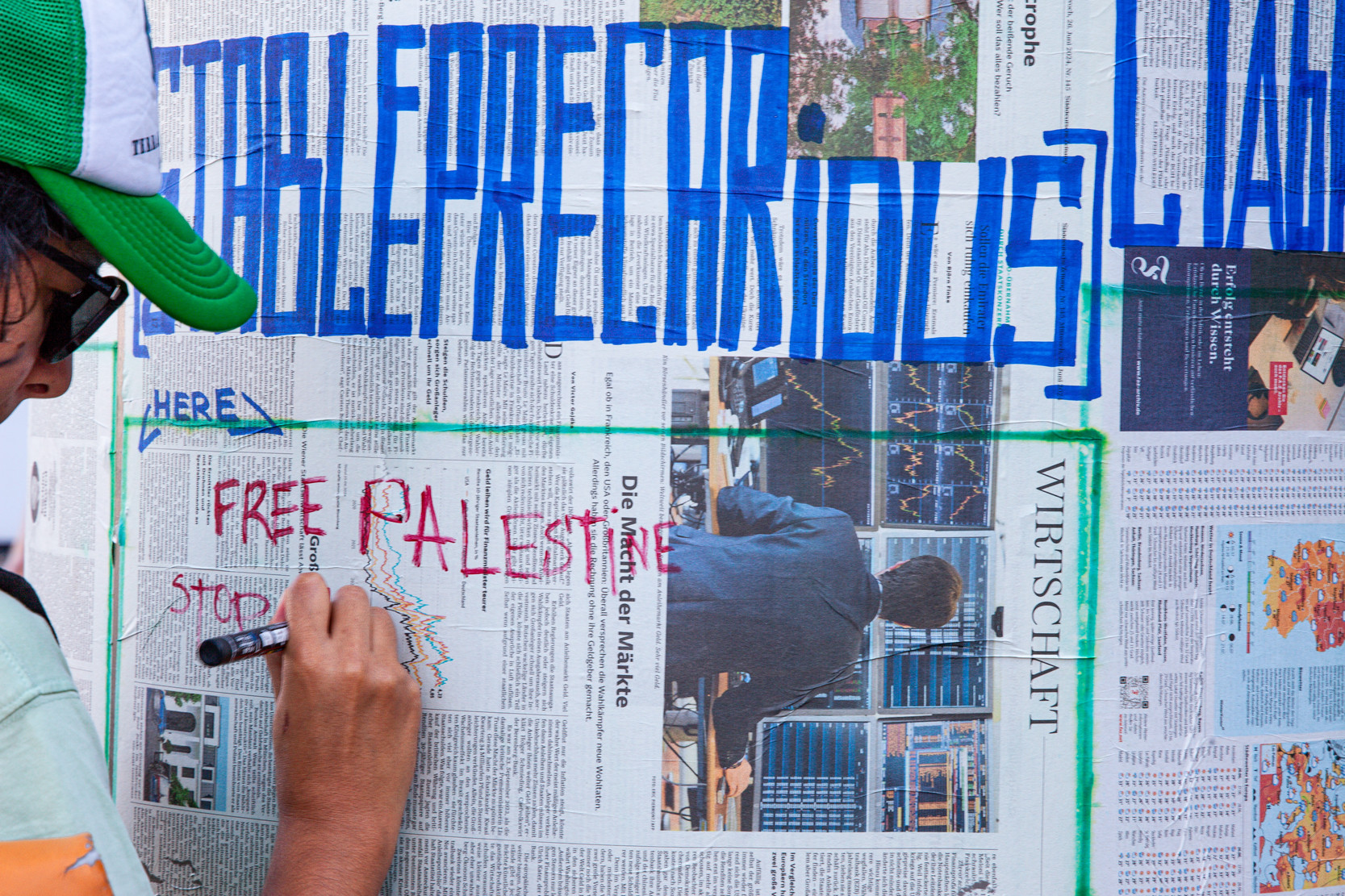
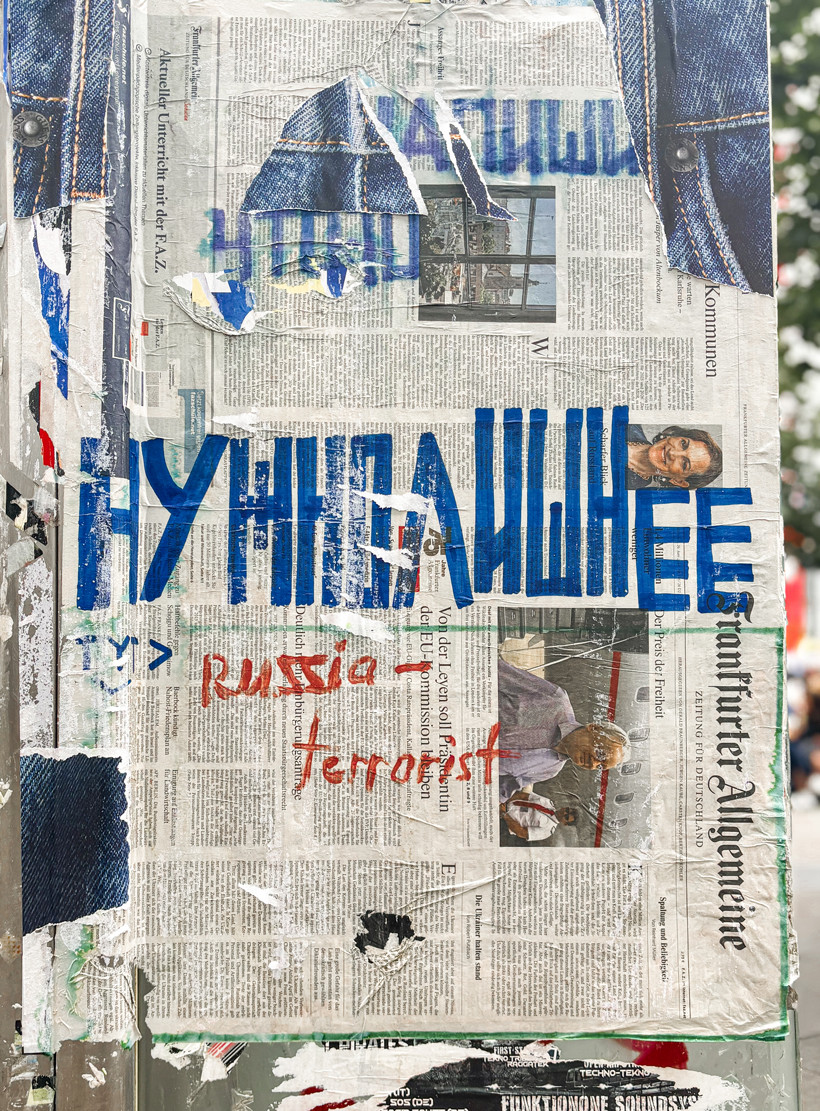
They listened to him, not agreeing, not denying, but accepting his despair. His words went into their listening silence, and rested there for days, and came back to him changed.
— Ursula K. Le Guin
darklight whiteblack coldwarm elastichard heavylight softhard shorteternal deadlive uglybeautiful straightwry funnysad falsetrue shortlong sharpsmooth strongweak bittersweet goodbad fastslow highlow stableprecarious oldyoung drywet sillysmart necessaryexcess oddordinary poorrich boringcurious deadlive loudquite wonlost alwaysnever noyes
Words come back changed. Language is reappropriating and opening up possibilities for other ways of thinking.
Demonopolize Languages
What do the slogan "Free Palestine," migrants’ anti-migrant rhetoric and global climate change have in common? Actually, there is a lot in common. At the very least, today they form the foundation of political debate, they are at the center of attention and discussion. But there is something else: they all met, intertwined and superimposed on each other in a specific place and time, on the threads of architectropoetry, a three-dimensional polygon on which a poem is born out of something by linking words together through threads.
The colonial structures have chosen and still pointing languages as one of the first focuses of their violence. Vernacular languages are eliminated, declared "uncivilized" and "undeveloped." Lingua franca is imposed by violence and infrastructurally. Languages are dying. Vernacular languages are important to support.
We all benefit of polylingualism
It is important to smash the monopoly on languages from the colonists and national states and use languages to be together and build spaces of solidarity. Those who declare a language a national territory are engaging in protectionism of their privileges. Language — Russian, English, German — does not belong to any nation-state. Nation states own nothing at all, except their propaganda of disunity.
Language belongs
to those
who speak
Colonial thinking would like to take away the languages of communication from the colonized so that the lines of solidarity are fewer and thinner. But this is a sick plan. Languages are pidginized and left out of national territories, they belong to everyone and everything, and they have no flag or constitution. Languages are simultaneously deadalive, uglybeautiful, necessaryexcess, loudquiet.
There are approximately 200 countries in the world and in most of them the state uses and validates, in one way or another, the use of only one language. That is 200 state languages and a little more if we consider the few states that validate more than one language, the rest of the seven thousand existing languages are not supported by a "state and an army", to paraphrase the philologist Max Weinreich. The rest of the seven thousand languages exist against the state and in spite of it.
— Yásnaya Elena Aguilar Gil
Poetics of Relations
At the end of June 2024, philosopher Sasha Carpov and the de_colonialanguage collective developed a gamefield-net to be a collective space for utterance, for instance, to write a poem together. First of all, it was a space of sharing. Visitors to the Open Air Museum of Decoloniality wrote slogans, verbs, names, punches from rap songs, placed them in the field-net, and then connected their words with the words of others left in this pink net. The languages varied — English, Russian, Polish, Arabic, German, and others. We followed the threads-connections and assembled a polylingual poem with it.
The result was a collective poetics, a collaborative text, a text written by the square, by passers-by, by threads, by music, by the police, by talks and laughs, by sharp political statements, by cardboard, by bonds, by polyphony. The text is not flat: in line, in column, in rhyme — but multi-dimensional, words connecting to each other — along, and across, running up against each other, in reverse, diagonally, on strings, and ending in neither in nor.
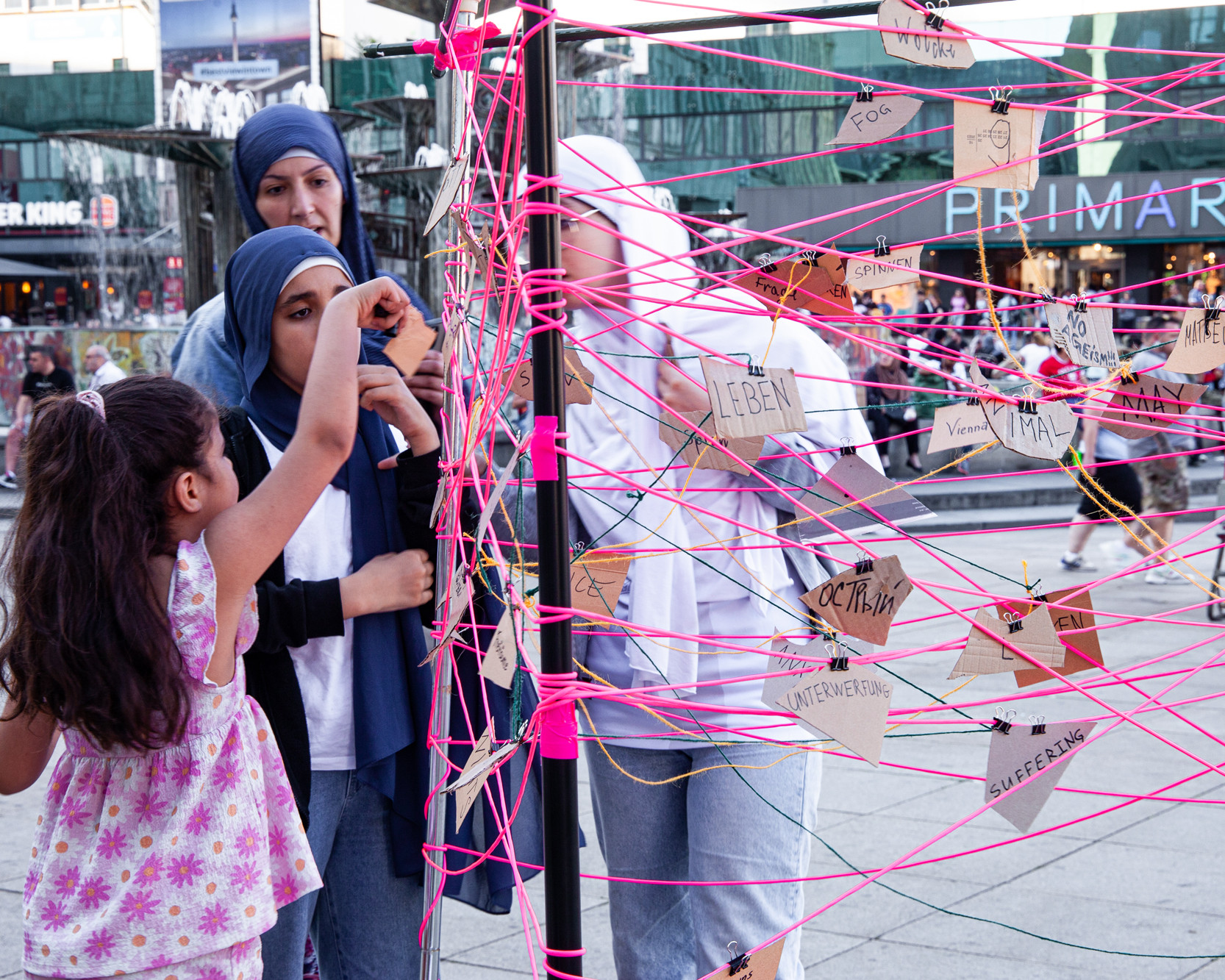
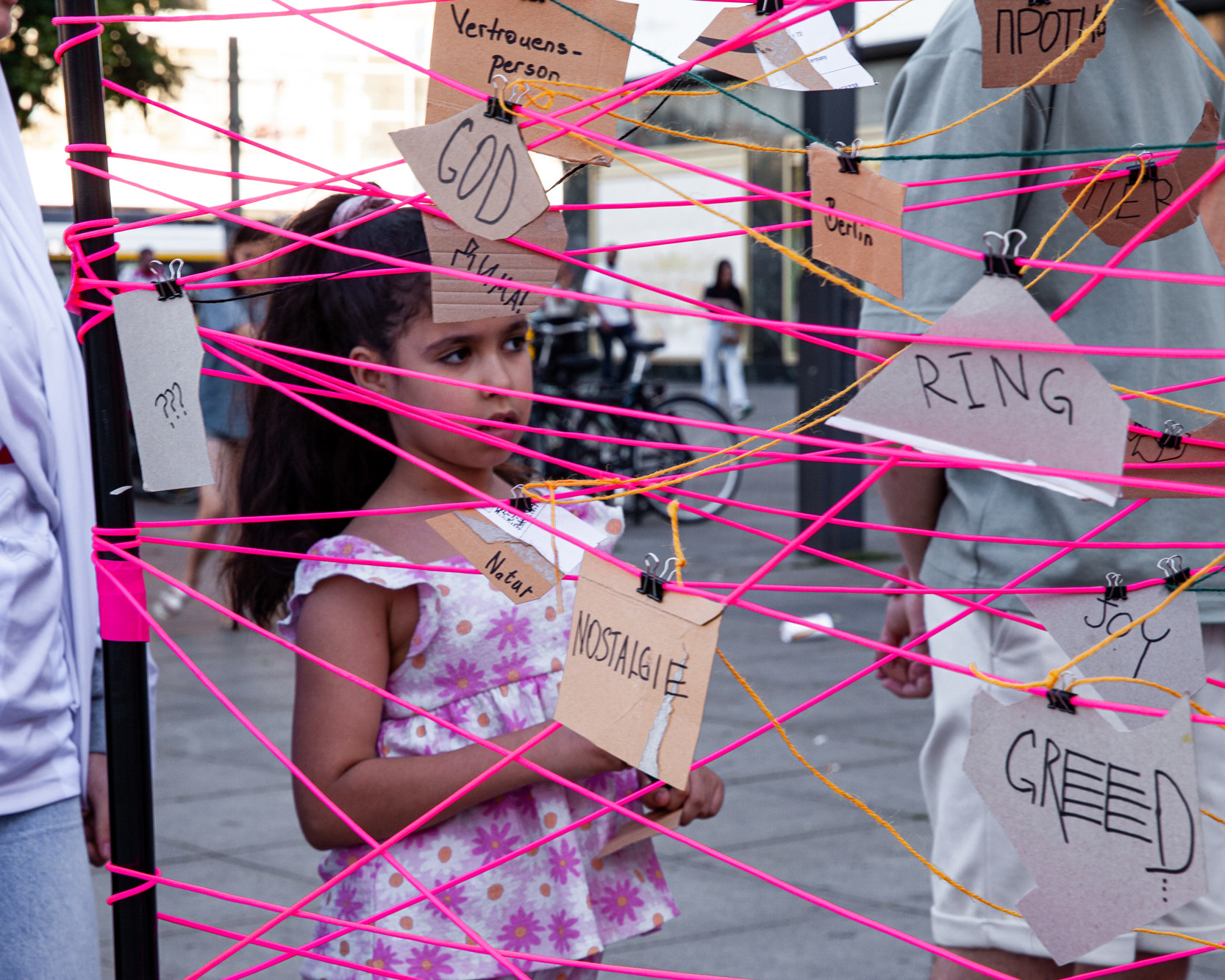
Behind every written, literally crafted line of text is a unique person, a singularity through whom a collective language speaks. Yet there are also universal, translingual political slogans. "Free Palestine" is not a descriptive-narrative sentence (like "it’s raining today"), but a performative. A political slogan calling for decolonization and an end to war certainly carries a share of descriptive information (if we call for making Palestine free, it trivially means that it is now unfree). However, its primary function is to enter the world in order to change it.
This field of language was intended to create conditions in which binary ways of speaking, of thinking, become naturally difficult and tend towards impossibility. The frame of binarity suddenly becomes sharp and uncomfortable. Meanwhile, the multiple connections and non-obvious intersections are fascinating in their open unpredictable flirt. Speaking one’s mother tongue and at the same time being in touch with people from other languages turns out to be very possible.
Not speaking in your mother tongue to avoid discrimination can deprive you of details, subtle turns of phrase and elaborate argumentation; seas of silences are erected and pragmatic language acts are privileged. Personal relations mediated by the use of language are therefore deeply politicised.
— Yásnaya Elena Aguilar Gil
The collective poem is a multidimensional performance in the most concrete sense of the word. First, the writing of the poem is performed, playfully acted out. Then the performance of the poem is "staged". Finally, the threads on which the cartons of words, the sheets of paper on which they are written and the screen of the monitor from which the text is read are connected turn into the final scene: the text "stands for itself", "speaks for itself", performs itself.
This is a poem in which the number of authors is countless, and the languages are multiple:
of BUILDING RELATIONS and FINDING a VOICES
Death ist[is] leider[unfortunately] rain Gott[God]
Frog run кошка[cat] rest support Pronouns to think Voice
Матвей[Matvey] Dima???
Free Palestine blue shining / сияние
مباشر / leben sein[to be a live] run pain resist Freiheit[Freedom]
Polizei No Ageism L pink woman / man
Father / mother God / may 6 / 9
Bezugsmenschen[significant other] freiräume[free spaces] life love denken[think] / nostalgie
Hope sky / spion[spy] God / may 6 / 9
Шум[noise] пусть[so] так[be it]!
Suffering kid / усы[mustache] freedom
Patriarchy spionage[espionage] unterwertung[subjugation] / submission
Frog rain wolke / облако[clouds]
Meet animal
Cat / кошка 0 / zivilist_in[civilian*]
Carpe diem[enjoy the moment] love life hippie freedom
??? / ❤ Матвей[Matvey]
Greed normal / sein[to be] schreien[scream] / verdecken[obscure]
Joy kid Freiheit[Freedom] suffering
Animal & meer[more]
May 9 May Police
Greed Normal
Love & cat
Кошка[cat] и[and] любовь[love]
Матвей[Matvey] Dima ♥
1 spion[spy] / Vertrauensperson[trust person] 1
1 Vienna / Berlin 2
2 Sky / Universe 2
Gott[God] is tod[death]
Кошка[cat] zivilist_in[civilian*]
Voice to think support rest run
Вокруг шум пусть так[Noise is around so be it]!
Free Palestine Free Palästina
Unterwerfung[subjugation] patriarchy
Bezugsmenschen denken freiräume[Significant Other think free spaces]
Anxiety Polizei schrein[shrine]
Polizei May
Nostalgia Zärtlichkeit[tenderness]
Love life
Усы[mustache] suffering Freedom
Denken[to think] Zärtlichkeit[tenderness]
Frog rain облако[cloud]
Fog blue shining
Женщина[woman] pink L no ageism
Hipsterskie życie wolnośí[Hipster life of freedom]
Mitośí chwytaj dzień[seize the day]
Home, sky God: Father and Mother
Fire sky Schnee[snow] Schrein[shrine] Häuser[houses] fur alle[for all] Berlin liberation ring God hope
Hope хуй[dick] Verrückt[crazy] welcome to Berlin Merkel Mama migrante Mama Terroriste Blue Кошка[cat] Liebesleben[love life] Cat Zivilist_in[civilian*]
Normal Denken[to think] Anxiety Frage[question] Schrein[shrine] Ok Berlin sky
Вокруг шум пусть так[Noise is around so be it]!
Normal to go blue picture of flower
Verrückt[crazy] Schnee[snow] Pain Freiheit[Freedom] Zuker[sugar] animal
Klimawandel[climate change] fire Schnee[snow] pain так[so]!
Free Palestine support freedom
Freihet freedom hippie leben[life] love carpe diem[enjoy the moment]
the text was written by
Alexandr Carpov and
the de_colonialanguage collective
